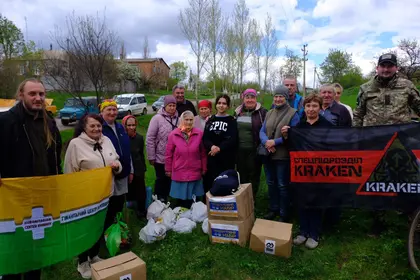After the Russian soldiers burned the flag flying from the village’s administrative office, Irena Blokha, the town manager, gathered up its ashes in a glass jar. She now stores that jar in a secret location until Ukraine has prevailed and Novy Burluk, some 25 kilometers from the official border with Russia, is fully safe again.
Today, Blokha’s task is to help with the distribution of aid to the village’s approximately 325 current residents. An olive drab van, with shrapnel holes down one side, has arrived with some 40 boxes and 50 bags of free food provided by the Kharkiv Humanitarian Centre and the humanitarian program of Kraken, a special operations force that has operated in the district east of Kharkiv, Ukraine’s second largest city.
The volunteers proceed to distribute some 500 kilos of food stuffs to 109 of the village’s 149 households.
From occupation to liberation
“It’s good to see the village coming back to life,” Blokha says. “We had 502 people before the full-scale war and many people fled when, in May, there was a ‘green corridor’ during the occupation [which lasted from Feb. 24 to Sept. 12, 2022]. Now, people are coming back and we’re planning for the future.”
As the weeks of occupation wore on, the commander would wander the village at night, drunken and firing his revolver at cats and cans. Two residents were killed during the occupation and the school was destroyed.

Latest US Aid Package for Ukraine Probably Includes ADAM Anti-Personnel Mines
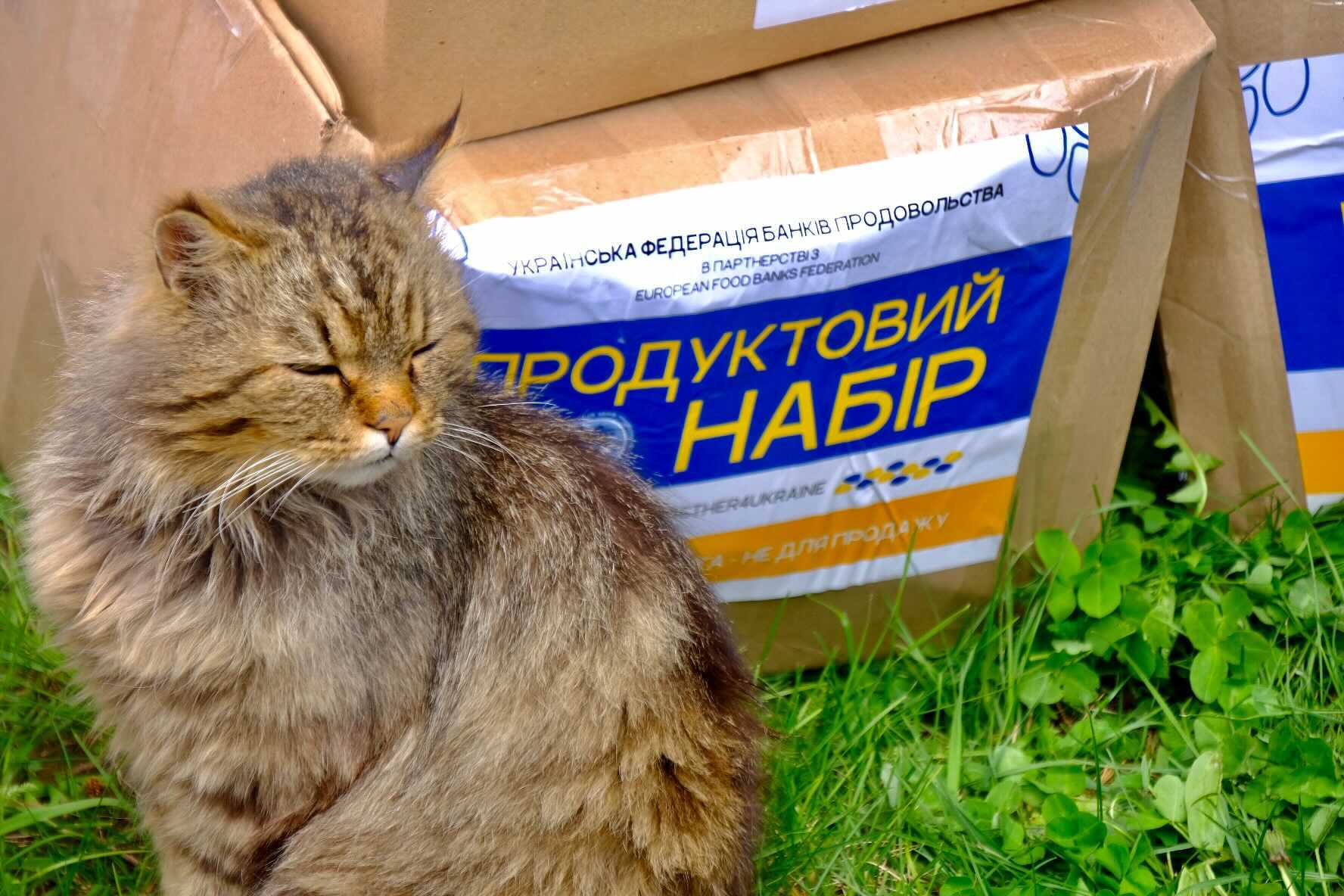
A local cat guarding supplies. PHOTO: Kyiv Post
At one point, the occupiers collected all the residents’ mobile phones. They scrolled through each phone’s content for patriotic Ukrainian symbols or songs, or evidence of Ukrainian military service. Men who had fought in the Donbas were then beaten up.
“They came to ‘liberate’ us. The only thing the Russians ‘liberated’ here was our washing machines,” Blokha says.
She apologizes for tearing up as she tells the story to 'Max', the Kraken soldier who runs the Kharkiv Humanitarian Center that works in the region’s recently de-occupied settlements.
The soldier who tends to those he protects
Nearly every day, staring before 8 a.m., Max and the Center's volunteers pack up vehicles in Kharkiv with donations from some 26 countries of the world. Then, they drive down roads ripped up by tank treads and past some villages that have been completely levelled. Once at their destination, they distribute items such as food, hygiene products, knitted hats and batteries to locals.
Today’s products have been donated by the Canada-Ukraine Foundation, a diaspora organization, and the Ukrainian Federation of Foodbanks, which redistributes excess items from supermarket chains.
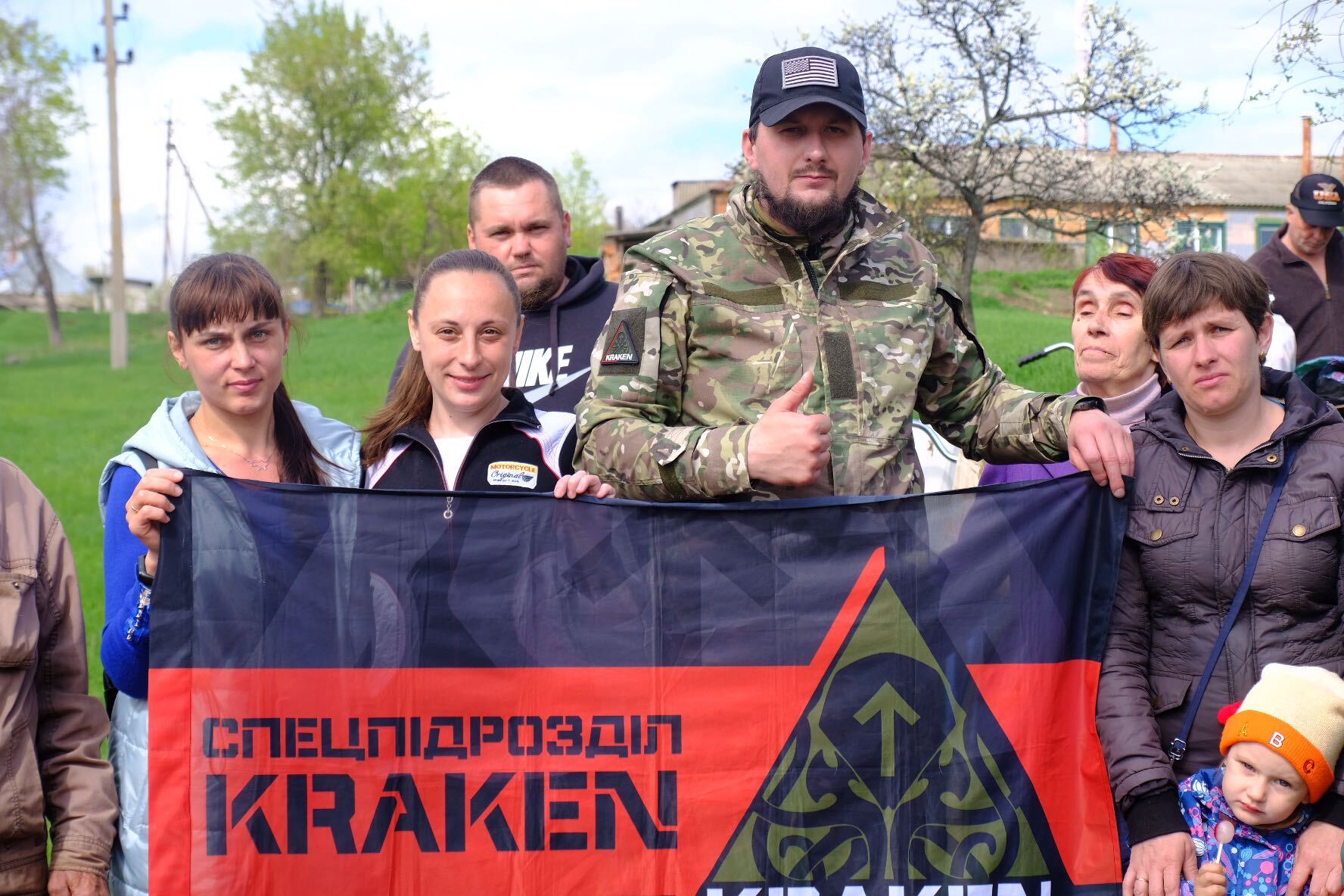
Max, Kraken soldier who runs a humanitarian program, gives a thumbs-up. PHOTO: Kyiv Post
“We want to show that as Ukrainian soldiers, we are nothing like the Russians. In that sense, it’s about ‘hearts and minds,’ but it’s also just important to help where we can,” Max says. “These people have suffered. Their incomes have been destroyed because many fields are mined and can’t be planted now.”
Although Max claims that “we can keep feeding them forever, and we will if we have to,” he also acknowledges that “it’s not the answer.” He is clear about what needs to be done: “The only real solution is to win the war as fast as possible and make life safe for them again.”
Max asks Blokha what her biggest challenges going forward are. She says that restoring and reopening the damaged school, which the occupiers used as one of their bases, is her first priority, but that the village will not be able to do so on its own.
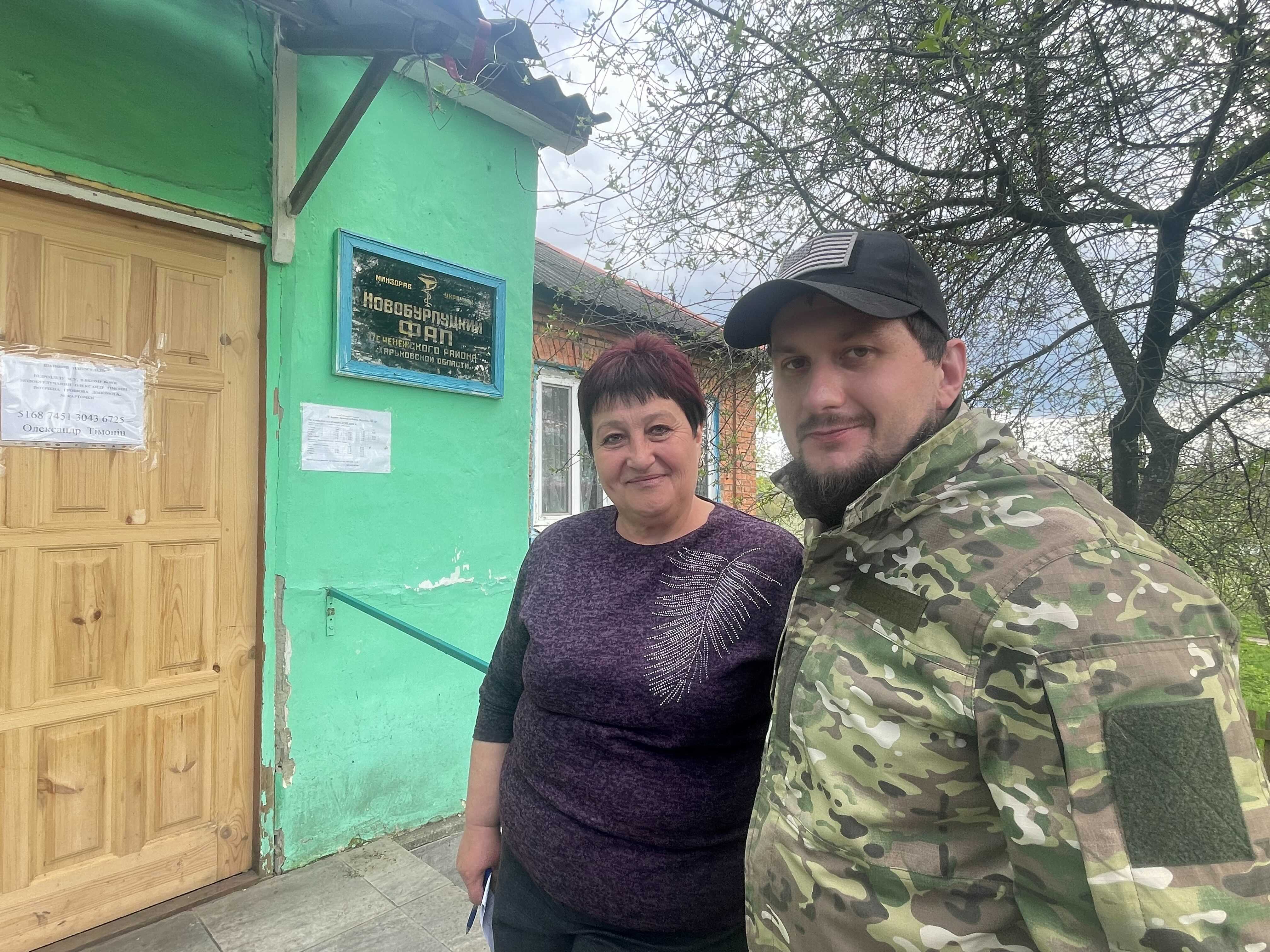
Irena Blokha, Novy Burluk town manager, and Max, Kraken humanitarian program, PHOTO: Kyiv Post
On the drive back to the city, past hundreds of structures destroyed by tank or artillery fire, Max considers what NGO support and funding options may be available to Novy Burluk. It’s not a regular assignment for a soldier.
“They will be alright in the end. That’s a town founded by free Cossacks in 1702. They survived not just this occupation, but the Holodomor [artificial famine imposed on Ukraine by Stalin]. It’s another stage in our history of fighting for independence,” Max says.
Where some 200 Russian vehicles – armored personnel carriers, tanks, and artillery pieces mostly manned by crews from far-flung Buryatia, near Mongolia – stood at the top of the town on the first days of its occupation, there is an old monument. It is partly dedicated to Andriy Movchan, who founded the first Communist collective farm in the village in the 1920s. The plaques on the monument say that in 1930 he was apparently “murdered by white-bandits and kulaks,” presumably Ukrainian farmers who would not become part of the Soviet Russian system of control.
Victoria Saray, 29, and her friend, Tetiana Redko, 28, stand in the line for the food distribution. They have lived in Novy Burluk all their lives. Both have married there and between them have 4 children under 11. With their children, they fled the village in the May 'green corridor' and returned after Ukrainian forces took it back without firing a shot in its vicinity.
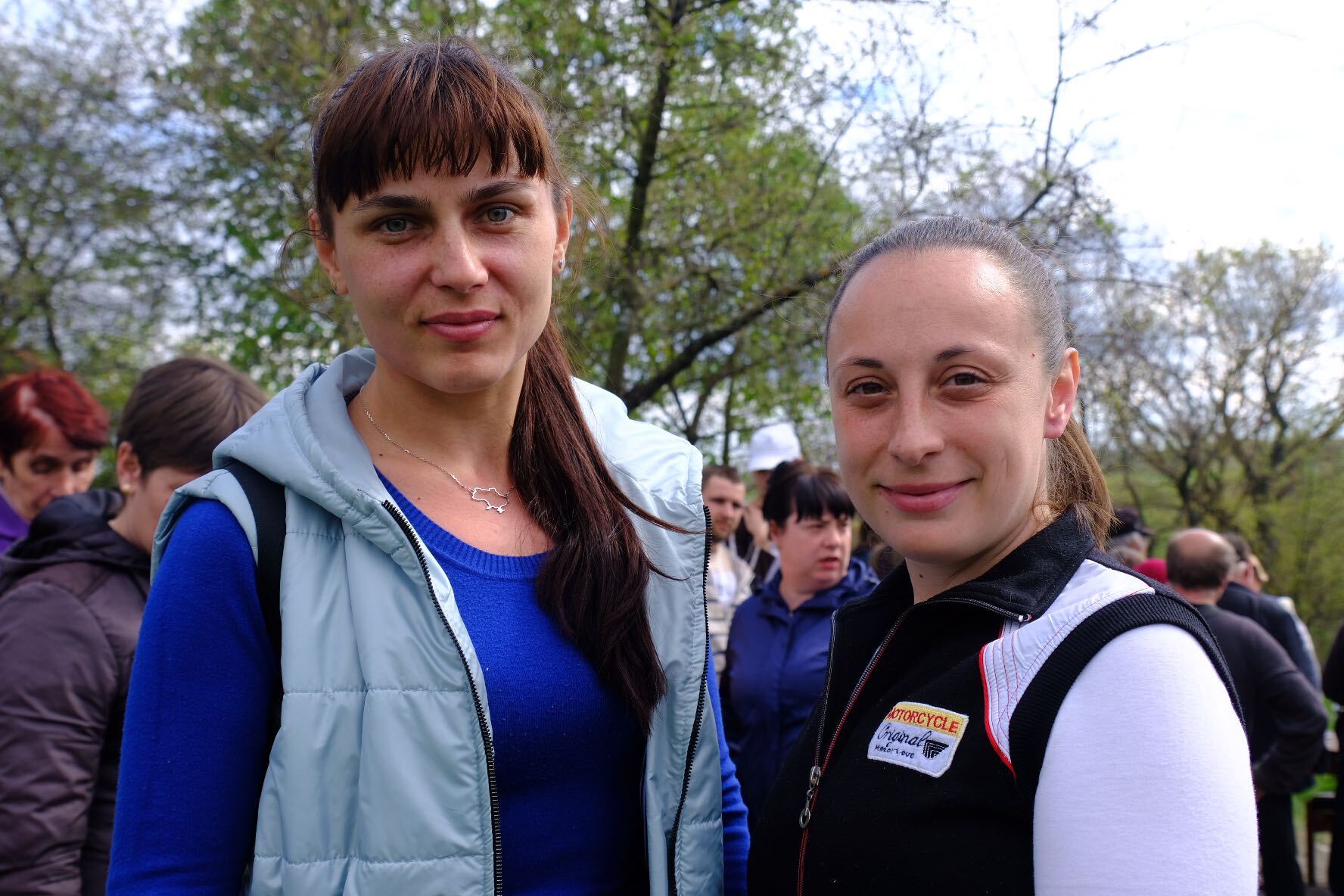
Victoria Saray and Tetiana Redko of Novy Burluk. PHOTO: Kyiv Post
“We believe everything will be okay because we have to,” Saray said. “It’s impossible to live if you don’t believe that. For now, we pay for the internet for the kids’ education and we get on with our lives.”
Back at the Kharkiv Humanitarian Center’s small warehouse, it’s now 10 p.m. Another group of volunteers is there packing up goods for distribution tomorrow in the Izyum district. They’re busy making 100 bags of kasha, green beans, toothpaste, energy bars and sundry other items.
Max makes himself his fourth or fifth coffee for the day.
“Of course, I’m tired. And I probably have PTS too. I almost got short with some guys on the metro who were talking shit about our positions. It’s impossible to come under an artillery assault and stay the same. The work, though, just becomes ‘automatic.’ You get in the routine and you keep pressing ahead. Damn, I've got friends being shot at. If they can keep going...” Max said.
One of the volunteers says they’re about to run out of plastic shopping bags. A discussion starts about where to get some more before the official curfew.
You can also highlight the text and press Ctrl + Enter


